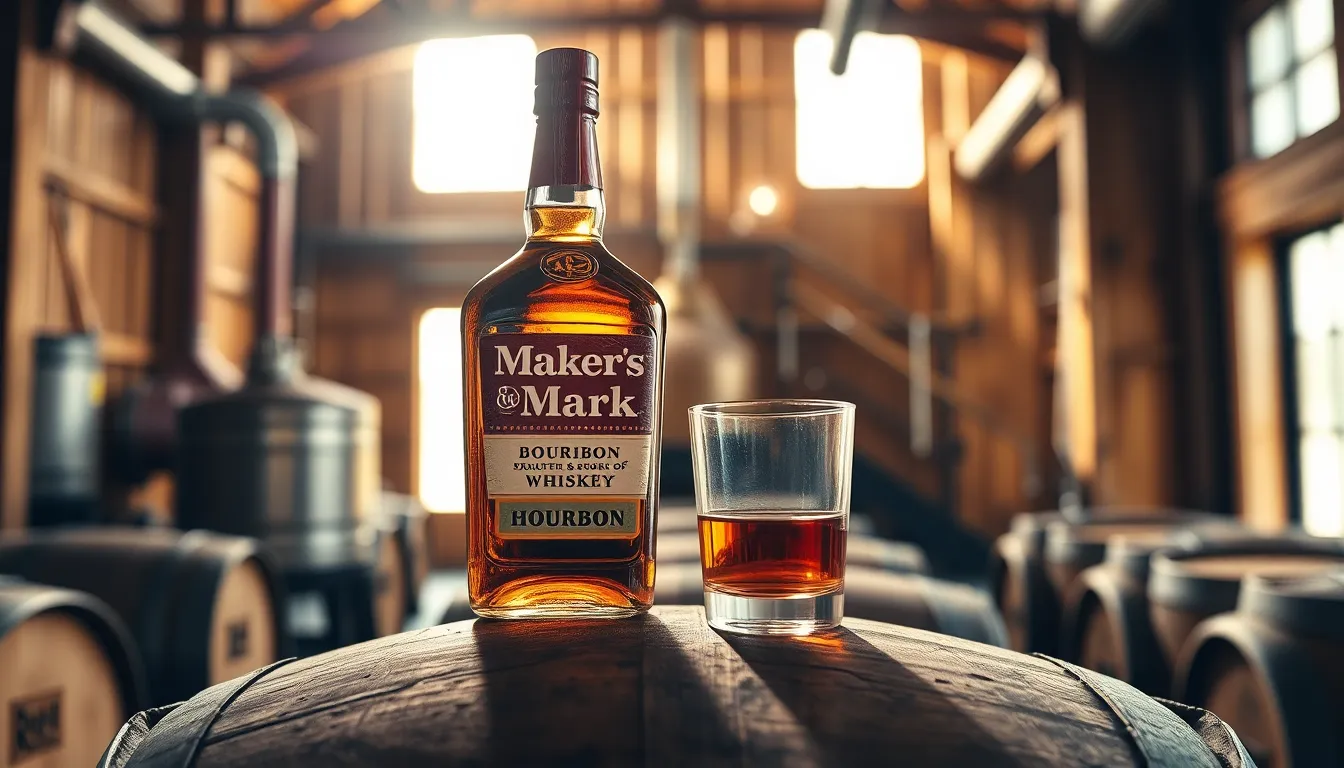Table of Contents
ToggleFor whiskey lovers navigating the gluten-free landscape, the question of whether Maker’s Mark is safe to sip can feel like a high-stakes game of roulette. After all, nothing ruins a good time like a surprise stomach ache. With its smooth, rich flavor and that iconic red wax seal, Maker’s Mark has charmed many a palate. But does it play nice with gluten sensitivities?
Overview of Maker’s Mark
Maker’s Mark stands out as a well-known bourbon whiskey, produced in Loretto, Kentucky. This brand garners attention not only for its craftsmanship but also for its signature smooth taste. Bottled at 90 proof, Maker’s Mark possesses a rich flavor profile, characterized by sweet vanilla, caramel, and a hint of spice.
The production process employs red winter wheat instead of rye, which enhances the whiskey’s smoothness. Each batch undergoes meticulous attention, ensuring consistency and quality. The whiskey ages in charred oak barrels, allowing it to develop complex flavors over time. This aging process contributes to its distinct profile, making it a favorite among whiskey enthusiasts.
As for gluten content, Maker’s Mark is produced from corn and wheat. While traditional whiskey often comes from grains like barley, the key ingredient here remains corn. Distillation typically removes gluten. Thus, Maker’s Mark may be considered gluten-free. However, individuals with severe gluten sensitivities should consult their healthcare providers before consumption.
Those who appreciate bourbon often enjoy Maker’s Mark neat, on the rocks, or as part of a cocktail. Mixing with ginger ale or soda creates a refreshing drink that highlights its flavors. Overall, Maker’s Mark provides a satisfying option for both casual drinkers and serious connoisseurs alike.
Ingredients in Maker’s Mark

Maker’s Mark features a blend of carefully selected ingredients that contribute to its unique flavor profile. It contains traditional components commonly found in whiskey production.
Primary Ingredients
Corn serves as the primary grain in Maker’s Mark, comprising about 70% of the mash bill. Red winter wheat follows, making up 16%, adding softness and sweetness to the bourbon’s taste. Barley, specifically malted barley, completes the mash bill at 14%. The combination of these three grains creates a smooth and rich flavor, distinguishing Maker’s Mark from other bourbons, particularly those that use rye.
Supplemental Ingredients
In addition to the main grains, yeast plays a crucial role in the fermentation process of Maker’s Mark. The distillers use proprietary yeast strains, which enhance the bourbon’s complexity. Water sourced from a limestone aquifer adds mineral qualities that further refine the final product. Each element combines to produce the whiskey’s signature smoothness, making it suitable for diverse palates. The meticulous selection of ingredients and production processes ensures a high-quality bourbon experience, essential for both casual drinkers and enthusiasts.
Gluten-Free Status of Maker’s Mark
Maker’s Mark whiskey raises questions about its gluten-free status, particularly for those with gluten sensitivities. The distillation process plays a crucial role in determining whether gluten remains in the final product.
Distillation Process
Distillation typically eliminates gluten, as it separates alcohol from the mash. Maker’s Mark undergoes a double distillation process, which contributes to the removal of gluten proteins. Bourbon’s high alcohol content, at 90 proof, further reduces the possibility of gluten presence. While the distillation methods suggest that Maker’s Mark is safe for most individuals, those with severe gluten sensitivities must consider individual reactions.
Industry Standards
National regulations do not officially recognize any spirits as gluten-free unless they contain no gluten-based ingredients. However, the Alcohol and Tobacco Tax and Trade Bureau allows manufacturers to label distilled spirits gluten-free if they meet specific criteria. Maker’s Mark claims a gluten-free status based on its distillation process. Despite these assurances, individuals with extreme gluten intolerance should consult healthcare providers before consuming any whiskey.
Alternative Gluten-Free Bourbon Options
For individuals seeking gluten-free bourbon options, several brands cater to this preference. Popular choices include Four Roses, Buffalo Trace, and Woodford Reserve, known for their smooth flavors and high-quality production. Four Roses uses a unique blend of yeast and various recipes, leading to a rich profile that many appreciate.
Buffalo Trace offers a full-bodied bourbon with notes of caramel and vanilla, providing a satisfying tasting experience for enthusiasts. Made from a mash bill primarily featuring corn, it meets gluten-free criteria. Woodford Reserve also stands out for its craftsmanship, boasting a smooth and complex flavor profile that includes hints of dried fruit and spice.
Another choice is Breckenridge Bourbon. This brand combines corn, rye, and malted barley, emphasizing that the distillation process eliminates gluten. Additionally, it features a balanced flavor with a hint of sweetness.
Knob Creek, recognized for its bold taste, remains another viable option. Its production process allows it to qualify as gluten-free despite containing grains often associated with gluten. The rich, robust notes appeal to those who enjoy a stronger bourbon experience.
Clyde May’s offers yet another alternative with a unique blend of sweet and smoky flavors. Made from corn and aged in charred barrels, it provides a distinctive taste, appealing to those looking for new bourbon experiences.
Each of these brands provides a compelling option for those avoiding gluten in their spirits. Individual taste preferences will play a substantial role in the selection of a favorite bourbon. Always checking labels can further help ensure that the choice aligns with gluten-free needs.
Maker’s Mark offers a smooth and flavorful bourbon experience that many enjoy. While its distillation process suggests it may be safe for those with gluten sensitivities, individual reactions can vary. Those with severe gluten intolerance should always consult healthcare providers before indulging.
For whiskey lovers seeking alternatives, several other gluten-free bourbons deliver unique and satisfying flavors. Ultimately, knowing personal preferences and understanding ingredient labels can enhance the enjoyment of bourbon while prioritizing health and safety.







